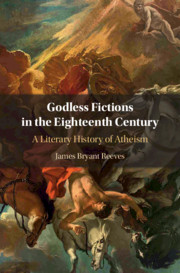Book contents
- Godless Fictions in the Eighteenth Century
- Godless Fictions in the Eighteenth Century
- Copyright page
- Contents
- Acknowledgments
- Introduction
- Chapter 1 A Complete System of Atheism: Jonathan Swift
- Chapter 2 Godless Dunces: Alexander Pope
- Chapter 3 The Limits of Self: Sarah Fielding
- Chapter 4 Gender and the Orient: Phebe Gibbes
- Chapter 5 Ecumenical Poetics: William Cowper
- Coda
- Notes
- Bibliography
- Index
Chapter 3 - The Limits of Self: Sarah Fielding
Published online by Cambridge University Press: 06 August 2020
- Godless Fictions in the Eighteenth Century
- Godless Fictions in the Eighteenth Century
- Copyright page
- Contents
- Acknowledgments
- Introduction
- Chapter 1 A Complete System of Atheism: Jonathan Swift
- Chapter 2 Godless Dunces: Alexander Pope
- Chapter 3 The Limits of Self: Sarah Fielding
- Chapter 4 Gender and the Orient: Phebe Gibbes
- Chapter 5 Ecumenical Poetics: William Cowper
- Coda
- Notes
- Bibliography
- Index
Summary
This chapter argues that eighteenth-century moral philosophers, divines, and literati almost unanimously agreed that theism is necessary to sustain community and social stability. With this correlation in place, atheists were routinely denied the capacity for human sympathy. To make this case, the chapter focuses on two midcentury novels by Sarah Fielding: The Adventures of David Simple (1744) and its sequel, Volume the Last (1753). In these fictions, Fielding employs atheism to explore both the limits of modern selfhood and the limits of literary representation. Alongside eighteenth-century moral philosophers like John Locke, Shaftesbury, and Lord Kames, whom I examine in the chapter’s first section, Fielding casts the atheist as the fundamental incarnation of a completely autonomous self. More to the point, she insists that that self is incapable of integrating successfully into a wider community defined by developing notions of civility, sociability, and fellow feeling.
- Type
- Chapter
- Information
- Godless Fictions in the Eighteenth CenturyA Literary History of Atheism, pp. 105 - 136Publisher: Cambridge University PressPrint publication year: 2020



